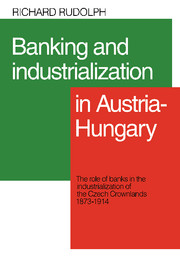 Banking and Industrialization in Austria-Hungary
Banking and Industrialization in Austria-Hungary Book contents
- Frontmatter
- Contents
- List of tables and charts
- Preface
- Abbreviations
- Introduction
- 1 Industrial development in the Austro-Hungarian Monarchy 1873–1914
- 2 Industrialization in the Czech Lands
- 3 Evolution of the financial structure
- 4 The relationship of banks to industry: the Viennese Great Banks
- 5 The relationship of banks to industry: the Czech banks
- 6 Sources of industrial credit
- 7 The role of the banks
- Appendixes
- Notes
- Select bibliography
- Index
Introduction
Published online by Cambridge University Press: 05 January 2012
- Frontmatter
- Contents
- List of tables and charts
- Preface
- Abbreviations
- Introduction
- 1 Industrial development in the Austro-Hungarian Monarchy 1873–1914
- 2 Industrialization in the Czech Lands
- 3 Evolution of the financial structure
- 4 The relationship of banks to industry: the Viennese Great Banks
- 5 The relationship of banks to industry: the Czech banks
- 6 Sources of industrial credit
- 7 The role of the banks
- Appendixes
- Notes
- Select bibliography
- Index
Summary
In recent years both economists and economic historians have shown increasing interest in the role of financial institutions in the process of industrialization. Among the less discussed but quite significant questions raised concerning the role of financial institutions is that of the degree to which the banks, themselves, have played a direct or motivating role in industrialization. It has been argued that “there are a number of historical instances in which financial institutions constituted leading sectors in development; these institutions were ‘growth-inducing’ through direct industrial promotion and finance.”
The debate, of which this quotation is a part, as to the varying degrees to which banks in given nations were passive, and arose almost automatically in response to the needs of commerce and industry, or to which they were active, and in some cases possibly initiated the process of industrialization, will no doubt continue for some time. In spite of the debate, however, there has been almost universal agreement that at least in the area of central Europe the banks played an extraordinary role in facilitating industrial growth. Germany, in particular, and the Austro- Hungarian Monarchy as well, have been cited as areas in which extremely intimate ties between banks and industrial firms existed, and in which such ties had profound ramifications upon industrial development.
In Alexander Gerschenkron's provocative writings concerning the methods of industrialization at various levels of economic backwardness, this role of the banks is depicted as being quite significant. According to Gerschenkron's overall schema, the mode in which industrialization comes about is determined by the size of the effort required by a given country to attain industrial growth.
- Type
- Chapter
- Information
- Banking and Industrialization in Austria-HungaryThe Role of Banks in the Industrialization of the Czech Crownlands, 1873–1914, pp. 1 - 5Publisher: Cambridge University PressPrint publication year: 1976
